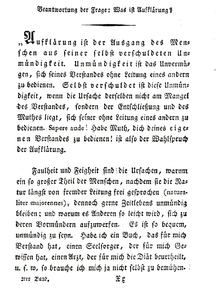Maturity (philosophy)
The term maturity describes the internal and external ability for self-determination and personal responsibility . Maturity is a state of independence . It says that you can speak and care for yourself. Maturity is often associated with the term emancipation .
Since Immanuel Kant , the term of maturity has had a historical-philosophical meaning. In his famous text, answering the question: what is enlightenment? of 1784 Kant writes:
“Enlightenment is the outcome of a person from his or her self-inflicted immaturity. Immaturity is the inability to use one's mind without guidance from another. This immaturity is self-inflicted if the cause of it is not a lack of understanding but a lack of resolution and courage to use it without guidance from someone else. ' Sapere aude ! Have the courage to use your own understanding!' is therefore the motto of the Enlightenment. "
The elucidation projects the process of growing of the immaturity of responsibility to the general human history . The concept of maturity serves as a central instrument of legitimation for understanding history as progress.
Elsewhere it says in Kant's article for the Berlin monthly magazine : “That the vast majority of people (including the whole fair sex) consider the step to maturity, besides the fact that it is difficult, also very dangerous: take care of that those guardians who kindly took over the supervision of them. "
